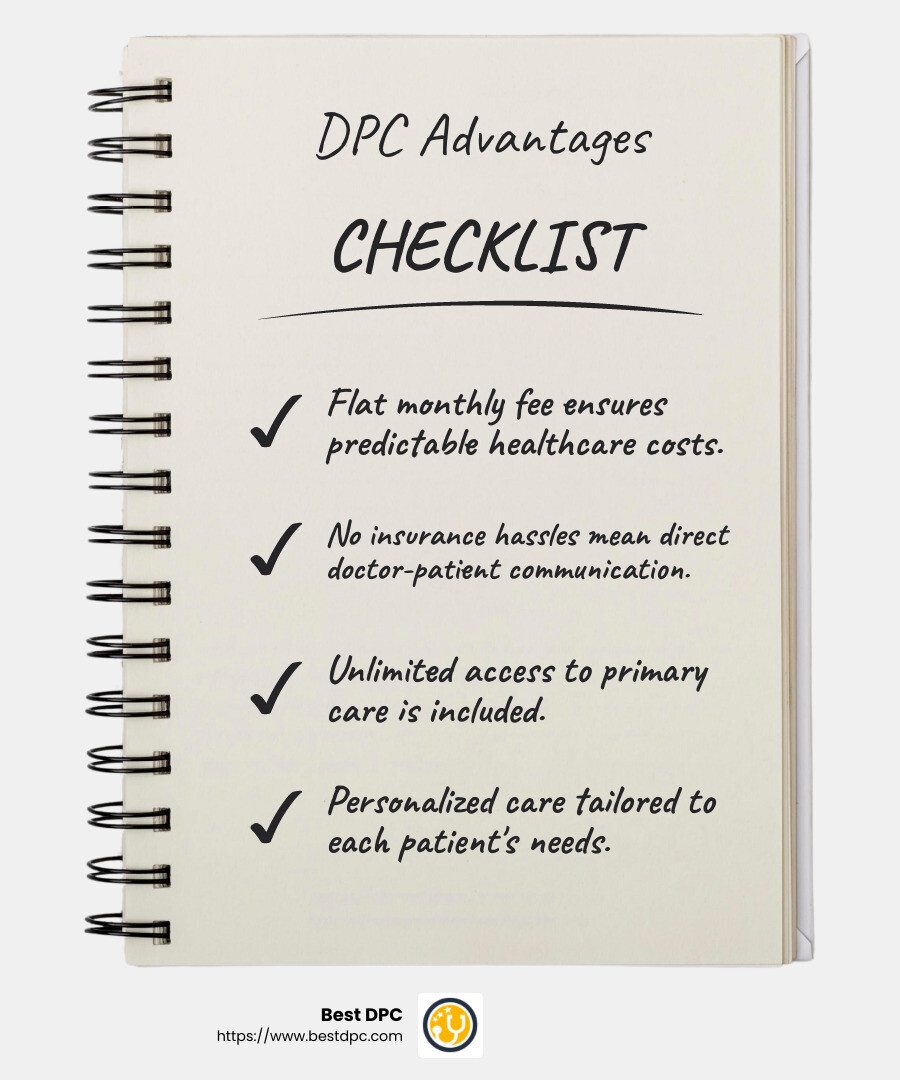Wayne Lowry

Finding Better Doctor-Patient Relationships in Direct Primary Care
Long waits and surprise medical bills can be frustrating. Direct primary care changes the way you experience healthcare. It centers on you and your needs. This personalized attention builds stronger doctor-patient relationships. The benefits are clear:
Direct primary care is gaining attention for solving common healthcare problems. It charges a flat monthly fee, cutting out complicated insurance and unpredictable costs. This lets doctors spend more time on patient care instead of paperwork. With fewer doctors and higher healthcare costs, direct primary care offers a refreshing change. Patients enjoy personalized, uninterrupted time with their doctor, which improves care and builds stronger relationships.

Understanding Direct Primary Care
Direct Primary Care (DPC) is a game-changer in healthcare. It’s all about making healthcare simple and straightforward for everyone involved. Here’s how it works:
Membership-Based Model
In DPC, you become a member of your doctor’s practice. Think of it like a gym membership but for your health. You pay a flat monthly fee, and in return, you get unlimited access to your primary care doctor.
Flat Monthly Fee
This monthly fee covers all your primary care needs. No more worrying about co-pays, deductibles, or surprise bills. Everything is included, from routine check-ups to managing chronic conditions.
No Insurance Hassles
One of the biggest headaches in healthcare is dealing with insurance companies. With DPC, you can leave those worries behind. There’s no need to file claims or wait for approvals. You get direct access to your doctor without middlemen.
This model allows doctors to focus solely on their patients. They can spend more time with each person, providing personalized care custom to individual needs. And for patients, it means better access to healthcare and more control over their medical expenses.

DPC practices are popping up all over the country, including in places like Tomball, TX, Altoona, PA, and Irvine, CA, offering a refreshing alternative to traditional healthcare models. It’s a win-win for both doctors and patients, creating a healthcare environment where relationships thrive and care is genuinely patient-focused.
Better Doctor-Patient Relationships in Direct Primary Care
Direct Primary Care (DPC) is changing how patients and doctors connect. It’s a model that fosters better doctor-patient relationships through personalized care, improved access, and increased satisfaction.
Personalized Care
In DPC, doctors have fewer patients. This means they can spend more time with each one. Longer appointments allow doctors to understand their patients better and tailor healthcare plans to individual needs. Imagine a doctor who knows your health history, your concerns, and your goals. This kind of personalized attention leads to more effective healthcare.
Improved Access
Access to healthcare is a major advantage of DPC. Patients can reach their doctor 24/7 via phone, text, or email. No more waiting weeks for an appointment. Instead, you can get same-day or next-day visits.
Improved Satisfaction
Patients in DPC report higher satisfaction levels. The trust and open communication fostered in these relationships make patients feel heard and valued. When patients are satisfied, they are more likely to engage in their own healthcare, leading to better outcomes.

DPC is not just about treating illnesses; it’s about building a partnership between doctor and patient. This partnership leads to better doctor-patient relationships and a more satisfying healthcare experience.
Benefits of Direct Primary Care
Direct Primary Care (DPC) offers numerous benefits that go beyond traditional healthcare models. Let’s explore how it excels in preventive care, chronic disease management, family-oriented care, and simplified billing.
Preventive Care
Preventive care lies at the heart of DPC. With more time per patient, doctors can focus on preventing diseases before they start. This proactive approach includes regular check-ups, screenings, and personalized health advice.
Chronic Disease Management
Managing chronic diseases effectively requires time and attention, both of which are available in DPC. Doctors can closely monitor conditions like diabetes, heart disease, or asthma, ensuring patients receive custom treatment plans and regular follow-ups.
Family-Oriented Care
DPC often serves entire families, providing a one-stop solution for healthcare needs. With a single provider for the whole family, there’s continuity and trust. Doctors can better understand the family’s health history, making care more effective and personalized.
Simplified Billing
Billing in DPC is straightforward. Patients pay a flat monthly fee, eliminating per-visit charges, co-pays, and insurance hassles. This simplicity makes healthcare costs predictable and transparent.

DPC is more than just a healthcare model; it’s a comprehensive approach that prioritizes patient well-being through preventive care, effective chronic disease management, family-oriented services, and hassle-free billing. These benefits make DPC an attractive option for individuals and families seeking personalized and accessible healthcare.
How Direct Primary Care Improves Accessibility and Affordability
Direct Primary Care (DPC) revolutionizes how patients access healthcare by making it more accessible and affordable. Let’s see how this model offers 24/7 access, reduced costs, and timely appointments.
24/7 Access
One of the standout features of DPC is the ability to reach your doctor anytime. Patients can contact their primary care provider through phone calls, texts, emails, or video chats whenever they need. This around-the-clock access ensures that patients get the care they need without unnecessary delays.
Reduced Costs
DPC offers a straightforward pricing model with a flat monthly fee. This fee covers a wide range of primary care services without additional costs for office visits or deductibles. By eliminating insurance paperwork and hidden fees, DPC helps patients manage their healthcare budgets more effectively.

Timely Appointments
With DPC, patients enjoy the luxury of same-day or next-day appointments. Because doctors limit their patient roster, they have more availability. This means no more waiting weeks to see a doctor, which can delay necessary care.
Better doctor-patient relationships in direct primary care make healthcare accessible and affordable for everyone. Patients enjoy 24/7 access, reduced costs, and timely appointments. This means getting the care you need without financial stress or long waits.
These improvements in accessibility and affordability make DPC an appealing choice for individuals and families looking for a more personal and cost-effective approach to healthcare.
Let’s dive into some common questions people have about Direct Primary Care.
Frequently Asked Questions about Direct Primary Care
What are the advantages of direct primary care?
Personalized Healthcare: Direct Primary Care (DPC) focuses on personalized care. Patients have more time with their doctors, allowing for deeper discussions about their health. This approach means that doctors can tailor treatments to each person’s unique needs.
Patient Satisfaction: Many patients report higher satisfaction with DPC. The ability to contact their doctor directly and schedule timely appointments without the hassle of insurance paperwork contributes to this satisfaction.
What are the disadvantages of DPC?
Limited Coverage: While DPC covers a broad range of primary care services, it doesn’t replace health insurance. Patients still need insurance for major medical expenses like surgeries or hospital stays.
Out-of-Pocket Costs: Although the monthly fee covers many services, patients might face additional out-of-pocket costs for specialist visits or emergency care. It’s important to balance these costs with the benefits of personalized care.
How does DPC improve doctor-patient relationships?
Direct Primary Care (DPC) strengthens doctor-patient relationships through personalized and accessible care. The fixed monthly fee means no insurance hassles, letting doctors spend more time with patients. This extra time fosters trust and open communication, allowing doctors to understand their patients better. Patients appreciate the easy access to care and the ability to reach their doctor directly, often through calls or texts. This leads to higher satisfaction and a sense of partnership in managing health. With DPC, the focus is on the patient’s needs, improving the overall healthcare experience.

Trust and Communication: With more time for each appointment, doctors and patients can build trust. Open communication encourages patients to share concerns and ask questions, leading to better health outcomes.
Comprehensive Care: DPC provides comprehensive care by addressing most of a patient’s needs within the practice. This continuity of care helps doctors understand a patient’s health history, leading to more effective treatment plans.
These aspects of trust, communication, and comprehensive care are vital to forming better doctor-patient relationships in direct primary care. Patients feel more connected and empowered in their health journey, making DPC a compelling choice for many.
Now, let’s wrap up by looking at how Best DPC highlights this patient-focused model in changing healthcare for the better.

Conclusion
Best DPC is redefining healthcare with a patient-focused model that emphasizes personalized care, accessibility, and affordability. By removing the barriers of insurance hassles and offering flat monthly fees, Best DPC allows patients to focus on what truly matters—their health.
Transformative Healthcare: The Direct Primary Care (DPC) approach is a game-changer in the healthcare industry. Patients experience improved satisfaction through personalized attention and comprehensive care. This model fosters better doctor-patient relationships, as patients have more time to communicate with their doctors, leading to trust and improved health outcomes.
Patient-Centered Model: At Best DPC, the focus is always on the patient. Patients benefit from 24/7 access to their doctors, reduced costs, and timely appointments, making healthcare not just a service but a partnership.
Experience the future of healthcare with Best DPC and join a community where your health is the priority. Find how personalized care can transform your health journey today.

ABOUT AUTHOR
Wayne Lowry
Wayne Lowry, Founder of BestDPC, is a passionate advocate for Direct Primary Care (DPC) and its mission to deliver personalized, accessible healthcare. He believes that DPC providers should serve as the trusted first point of contact for all medical needs, ensuring patients never feel isolated or uncertain about their health decisions. Through his work, he champions a patient-first approach to healthcare, building a system that prioritizes guidance, support, and trust.

Thank You for Registering!
Your registration was successful! We're excited to have you on board. Please check your email for a confirmation link to complete your registration.